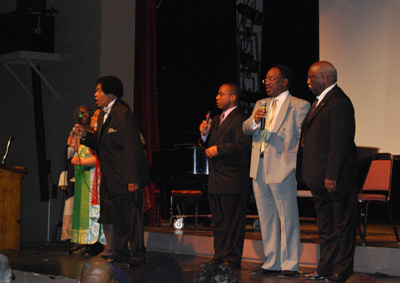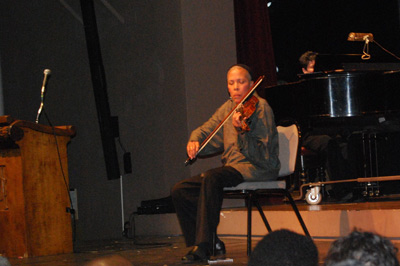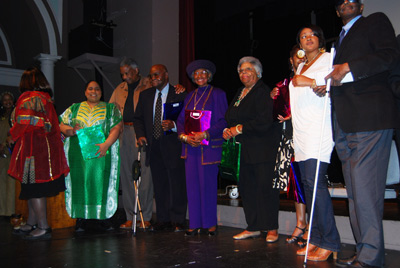 “What they did not know was that a people who could not write their own name in any language were now writing for all time, one of the grandest pages in the history of the whole world of music.”
“What they did not know was that a people who could not write their own name in any language were now writing for all time, one of the grandest pages in the history of the whole world of music.”
These are the words of Hall Johnson, who is described as a tenacious preserver of Negro Spirituals from the 1920’s to the 1970’s. They are printed in the program notes of an extraordinary project that has just been completed by the Friends of Negro Spirituals (FNS), a nonprofit educational organization based in Oakland, California.
On March 30,2008, the Friends of Negro Spirituals presented to the public a project that began when co-founder Lyvonne Chrisman took an extension class at Mills College on the how-to’s of oral history. Each time the class was offered, more members of FNS were in attendance. What resulted was collaboration with Mills College and librarian Nancy McKay and an ambitious plan to identify 10 heritage keepers among the community and record their oral histories regarding the role of Negro spirituals in their lives. The collected transcripts and interviews on DVDs are now available to the public through the Oakland Public Library’s History Room, the African American Museum and Library and Mills College. The project is supported in part by ACTA’s Living Cultures Grants Program.
 The importance of these spirituals are that they are vividly connected to the brutal shared history of enslaved ancestors and their lives. Preserving the integrity of the spirituals as the Black slaves sang them is an important link to a past. As versions of these songs are overshadowed by classical versions and offspring like gospel, blues, and jazz, the spirituals are in danger of losing their link to the past. In 2007 the Congress of the United States adopted a resolution that “the first expression of a unique American music was created by enslaved African-Americans.”
The importance of these spirituals are that they are vividly connected to the brutal shared history of enslaved ancestors and their lives. Preserving the integrity of the spirituals as the Black slaves sang them is an important link to a past. As versions of these songs are overshadowed by classical versions and offspring like gospel, blues, and jazz, the spirituals are in danger of losing their link to the past. In 2007 the Congress of the United States adopted a resolution that “the first expression of a unique American music was created by enslaved African-Americans.”
Doug Edwards, a programmer and producer for the local Pacifica radio station KPFA, explains it this way: “Without going into the grisly detail, suffice it to say, only the strongest and hardiest survived the horrible and continuing shock to their mental and physical being,” referring to the boat ride his ancestors took from West Africa in slave ships to the new world. “We are, all of us, the descendents of those magnificent giants.” As one of the interviewed heritage keepers in this collection, Mr. Edwards continues to provide a look into the Black experience with his radio shows.
The presence of the ancestors was acknowledged by the pouring of libations to the ancestors and by the drumming of master Ghanaian drummer Pope Flynn. The future was well represented by the Oakland Youth Chorus who sang spirituals. As a nod to the continuity of this genre, director Lanell Martin was presented with a check from the FNS to support and continue her important work with youth.
 The culmination of the day’s events brought the heritage keepers and their interviewers to the stage to receive certificates and acknowledgement from the packed crowd of over 500 people. They are: William “Bill” Bell, a jazz pianist known as The Jazz Professor and the conductor of The Oakland Bay Area Community Chorus; Lyvonne Chrisman, vice president and co-founder of Friends of Negro Spirituals; Marcella Conley, retired college professor; Dr. Helen Dilworth, soprano and a Professor of Music at San Francisco City College; Doug Edwards, jazz programmer and producer, Pacifica radio station KPFA 94.1 FM Berkeley; Sam Edwards, president and co-founder of Friends of Negro Spirituals; Jacqueline Hairston, pianist, composer, Spirituals arranger, and educator; Autris Paige, baritone and professional narrator; Linda Tillery, cultural historian and artistic director of Linda Tillery and the Cultural Heritage Choir; Cleophas Williams, retired ILWU President; and his wife, Mrs. Sadie Williams.
The culmination of the day’s events brought the heritage keepers and their interviewers to the stage to receive certificates and acknowledgement from the packed crowd of over 500 people. They are: William “Bill” Bell, a jazz pianist known as The Jazz Professor and the conductor of The Oakland Bay Area Community Chorus; Lyvonne Chrisman, vice president and co-founder of Friends of Negro Spirituals; Marcella Conley, retired college professor; Dr. Helen Dilworth, soprano and a Professor of Music at San Francisco City College; Doug Edwards, jazz programmer and producer, Pacifica radio station KPFA 94.1 FM Berkeley; Sam Edwards, president and co-founder of Friends of Negro Spirituals; Jacqueline Hairston, pianist, composer, Spirituals arranger, and educator; Autris Paige, baritone and professional narrator; Linda Tillery, cultural historian and artistic director of Linda Tillery and the Cultural Heritage Choir; Cleophas Williams, retired ILWU President; and his wife, Mrs. Sadie Williams.
To learn more about the ongoing events of FNS, their recordings and journals, please visit their website.
